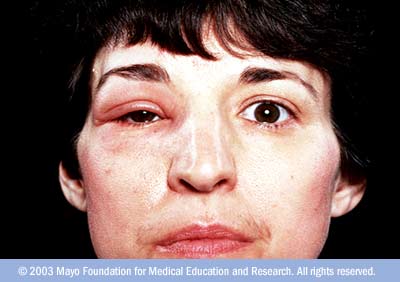Treatment
Mild symptoms may not need treatment. Moderate to severe symptoms may need treatment. Breathing difficulty is an emergency condition.

Cool compresses or soaks can provide pain relief.
Medications used to treat angioedema include:
* Antihistamines
* Anti-inflammatory medicines (corticosteroids)
* Cimetidine (Tagamet)
* Epinephrine
* Terbutaline (a bronchodilator)
If the person has trouble breathing, seek immediate medical help.
See: Breathing difficulties – first aid
At the hospital, a tube may be placed in the throat to keep the airway open.
Prognosis (Expectations)
Angioedema that does not affect the breathing may be uncomfortable, but is usually harmless and goes away in a few days.
Complications
* Anaphylactic reaction
* Life-threatening airway blockage (if swelling occurs in the throat)
Calling Your Health Care Provider
Call your health care provider if:
* Angioedema does not respond to treatment
* It is severe
* You have never had angioedema before
Go to the emergency room or call the local emergency number (such as 911) if you have:
* Abnormal breathing sounds (stridor)
* Difficulty breathing
* Fainting
* Wheezing
Angioedema: Overview, Causes
Angioedema: Symptoms & Signs, Diagnosis & Tests
Angioedema: Treatment
Reviewed By : David C. Dugdale, III., MD, Professor of Medicine, Division of General Medicine, Department of Medicine, University of Washington School of Medicine. Stuart I. Henochowicz, MD, FACP, Associate Clinical Professor of Medicine, Division of Allergy, Immunology, and Rheumatology, Georgetown University Medical School. Also reviewed by David Zieve, MD, MHA, Medical Director, A.D.A.M., Inc.
